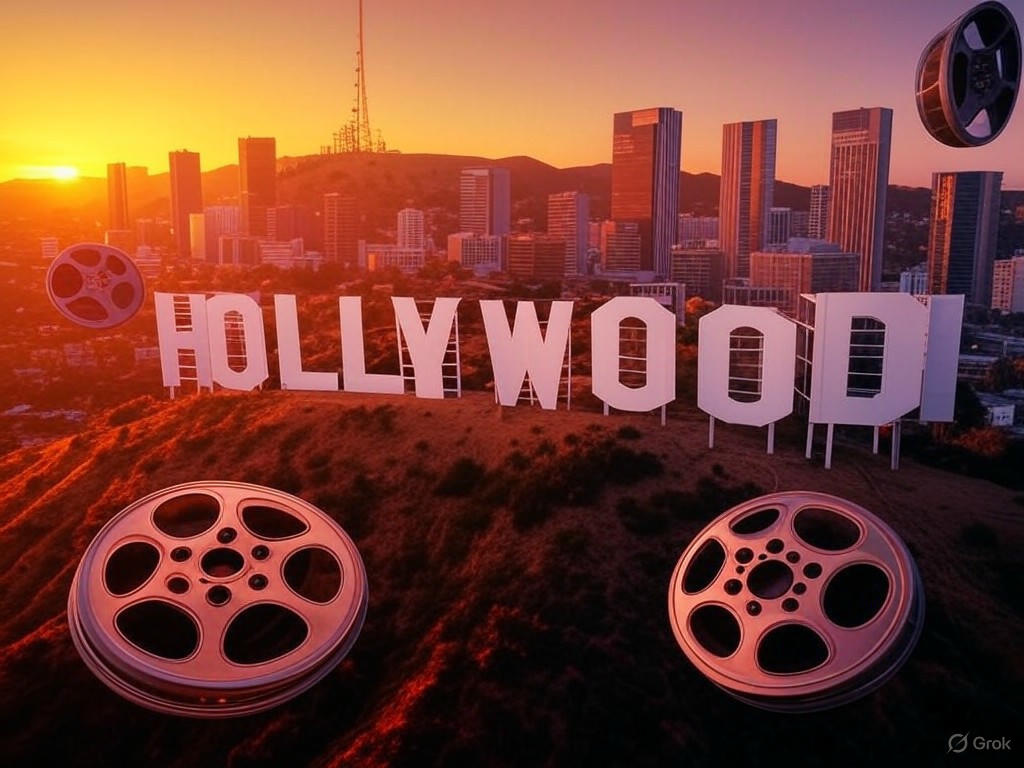
Hollywood’s crisis prevention as Trump’s potential 9th national emergency
Hollywood’s Uncertain Future in the Face of Trump’s National Emergency
Imagine Hollywood, the glittering heart of global entertainment, suddenly facing a storm of economic pressures. With President Donald Trump’s potential 9th national emergency on the horizon, the industry is bracing for impact. This Hollywood crisis Trump national emergency could amplify existing vulnerabilities as the sector fights to recover in 2025.
Trump’s latest moves, including his April 2025 declaration to tackle trade deficits, have already sent shockwaves through California’s economy. A blanket 10% tariff on all countries, plus steeper ones for major trade partners, puts Hollywood’s international deals at risk. Have you ever wondered how one policy shift could upend an entire creative ecosystem?
It’s not just about tariffs; it’s about the broader Hollywood crisis Trump national emergency that threatens jobs and production stability. Industry leaders are watching closely as these emergency powers disrupt the delicate balance of global film financing.
Los Angeles Entertainment Industry: Battling a Mounting Crisis
Los Angeles has long been the epicenter of dreams and blockbusters, but right now, it’s in survival mode. The Hollywood crisis sparked by Trump’s national emergency declarations is accelerating a troubling trend: productions fleeing to cheaper locales. This exodus means fewer opportunities for local crews and a hit to the city’s economy.
California’s Governor isn’t standing idle. By proposing to nearly double the state’s film and TV tax credits from $330 million to $750 million annually, there’s a real push to keep the magic alive here. What if these incentives could turn the tide on this Hollywood crisis Trump national emergency?
Supporters highlight the ripple effects—last year’s $152 million invested in 12 TV projects alone pumped about $1.1 billion back into the local economy. A poll shows 73% of voters backing this expansion, proving that everyday people see the value in propping up what makes LA shine.
The Economic Ripple of Production Incentives in Trump’s Emergency Era
Let’s break this down: tax credits aren’t just handouts; they’re smart investments. In California’s case, they could counter the Hollywood crisis driven by Trump’s national emergency policies. For instance, that $1.1 billion in economic activity from a single year’s projects shows how one dollar spent can multiply into many.
The California Production Coalition, a group of 33 industry players, is pushing for updates to make these incentives more competitive. They’re calling out outdated rules that exclude key areas like animation or above-the-line costs. Could streamlining this be the key to preventing a full-blown crisis?
Picture this: if incentives matched what’s offered elsewhere, like New Mexico’s 25-40% refundable credits, Hollywood might not lose so many big productions. It’s a strategy that’s working for rivals and could help LA hold its ground against Trump’s broader economic shake-ups.
Competitive Disadvantages Amid the Hollywood Crisis and National Emergencies
Despite its star power, California is lagging behind in the incentives game, and Trump’s national emergency declarations are making it worse. Hollywood’s crisis Trump national emergency highlights flaws in the state’s approach, from excluding certain costs to bureaucratic red tape.
For example, while Georgia offers a straightforward 30% tax credit with no strings attached, California leaves out directors and talent from the mix. That’s a big miss in an industry where star power drives decisions. How can Hollywood compete when other spots roll out the red carpet so easily?
These gaps are fueling the production drain. States like New Mexico not only cover more expenses but also simplify the process, drawing projects away and exacerbating the economic strain from Trump’s policies.
The Looming Threat of Trump’s Emergency Powers on Hollywood’s Crisis
Trump’s use of emergency powers, like the April 2025 declaration under the International Emergency Economic Powers Act, adds fuel to the Hollywood crisis. Tariffs aimed at trade deficits could snarl international co-productions that keep the industry thriving.
Think about your favorite global blockbuster—it’s often a web of cross-border deals. But with these tariffs in play, funding and distribution might get tangled in red tape. The open-ended nature of this emergency means Hollywood is planning in the dark, a risky spot for an industry built on long-term visions.
Critics argue that such declarations bypass checks and balances, potentially worsening the Hollywood crisis Trump national emergency creates. If you’re in the industry, this uncertainty might have you rethinking your next project.
Potential Impact on Film Distribution in This Hollywood Crisis Scenario
Global distribution is Hollywood’s lifeline, yet Trump’s national emergency could throw it into chaos. Co-productions with countries hit by tariffs might face higher costs or delays, directly tying into the broader Hollywood crisis.
Consider a hypothetical: a major studio partnering with European filmmakers could see budgets balloon due to new trade barriers. That’s not just a headache—it’s a threat to creativity and jobs. How can the industry adapt when economic policies shift so unpredictably?
Experts from sources like the Brennan Center warn of misuse, urging reforms to limit such powers. It’s a call to action that could ease the pressures on Hollywood’s recovery.
A Pattern of Emergency Declarations Fueling Hollywood’s Crisis
This isn’t Trump’s first rodeo; his string of declarations, including the January 2025 energy emergency, forms a pattern that’s rattling industries far and wide. For Hollywood, it’s another layer on the crisis pile.
Reform ideas, like requiring Congressional approval after 30 days, could prevent overreach. But for now, the Hollywood crisis Trump national emergency represents is very real, with each declaration adding uncertainty.
These moves might aim at broader goals, like bolstering domestic manufacturing, but they’re spilling over into entertainment. It’s a reminder that interconnected economies mean one policy can affect us all.
Hollywood’s Broader Challenges Beyond Trump’s National Emergency Crisis
Even without Trump’s shadow, Hollywood faces internal battles. From environmental disasters to tech giants reshaping content, the crisis runs deep.
Fires in LA have devastated neighborhoods, diverting funds that could support film projects. And let’s not forget the tech disruption—companies like Meta and Amazon are changing how stories reach audiences, often at Hollywood’s expense.
Environmental Disasters Adding to the Hollywood Crisis Layers
Wildfires aren’t just headlines; they’re costing millions in recovery, pulling resources from industry support. In this era of Trump’s national emergency, these issues compound the strain.
Taxpayers are footing the bill, which means less for incentives. What steps can communities take to build back stronger and more resilient?
Tech Industry Shifts in the Midst of Hollywood’s Emergency Woes
Big tech’s layoffs and data plays are upending distribution channels, making Trump’s policies feel like just one piece of a larger puzzle. Hollywood must navigate this to stay relevant.
Legislative efforts to curb tech dominance could help, but it’s a race against time. How might these changes redefine storytelling in the years ahead?
The Path Forward: Reinventing Hollywood Amid Crisis and Emergencies
So, where does Hollywood go from here? Bold changes are needed to counter the Hollywood crisis Trump national emergency has intensified.
Adapting Regulations to Ease the Crisis Pressure
Streamlining permits could make filming in LA a breeze again. It’s about creating a welcoming environment without losing the state’s creative spark.
Actionable tip: Push for digital permit systems to cut delays. This could be a game-changer in competing with Trump’s policy impacts.
Enhancing Incentives to Combat National Emergency Effects
Expanding tax credits to cover more costs, like talent fees, directly addresses the Hollywood crisis. It’s a strategic move to lure projects back.
Start by advocating for inclusive policies—your voice as a reader or industry fan could make a difference in these reforms.
Investing in Infrastructure During the Crisis
Rebuilding studios in fire-ravaged areas is crucial for long-term sustainability. Pair this with green initiatives to future-proof against more disasters.
A hypothetical scenario: A revamped lot with solar power could attract eco-conscious productions, turning crisis into opportunity.
Developing the Workforce in Turbulent Times
Training programs for emerging talent will keep Hollywood’s edge sharp. Focus on diversity to bring fresh perspectives amid the challenges.
Advice for readers: If you’re passionate about film, seek out local workshops—it might be your way to contribute to the industry’s revival.
Conclusion: Hollywood at a Crossroads in the Face of Crisis
At the end of the day, Hollywood’s fate hinges on proactive steps to navigate Trump’s national emergency and the underlying crisis. From tax reforms to adapting to tech shifts, there’s a path to resilience.
I’d love to hear your thoughts—how do you think Hollywood can bounce back? Share in the comments, explore more on our site, or spread the word to keep the conversation going.
References
- Brennan Center. “How the President is Misusing Emergency Powers to Impose Worldwide Tariffs.” Link
- White House. “Fact Sheet: President Donald J. Trump Declares National Emergency…” Link
- White House. “Declaring a National Energy Emergency.” Link
- Holland & Knight. “Trump’s 2025 Executive Orders Chart.” Link
- FilmTake. “Is Hollywood Worth Saving? The Harsh Reality Facing L.A. in 2025.” Link
- Writers and Editors. “Communicating and Marketing Online.” Link
- USTR. “U.S. Trade Representative Issues Statement on President Trump’s Declaration.” Link
- EP. “Film Incentives in North America: 2024 Review and Look Ahead to 2025.” Link
Hollywood crisis Trump national emergency, Hollywood crisis, Trump national emergency, California film industry, entertainment tax credits, film production decline, Los Angeles recovery, industry emergency impacts, Hollywood economic challenges, production incentives reform






